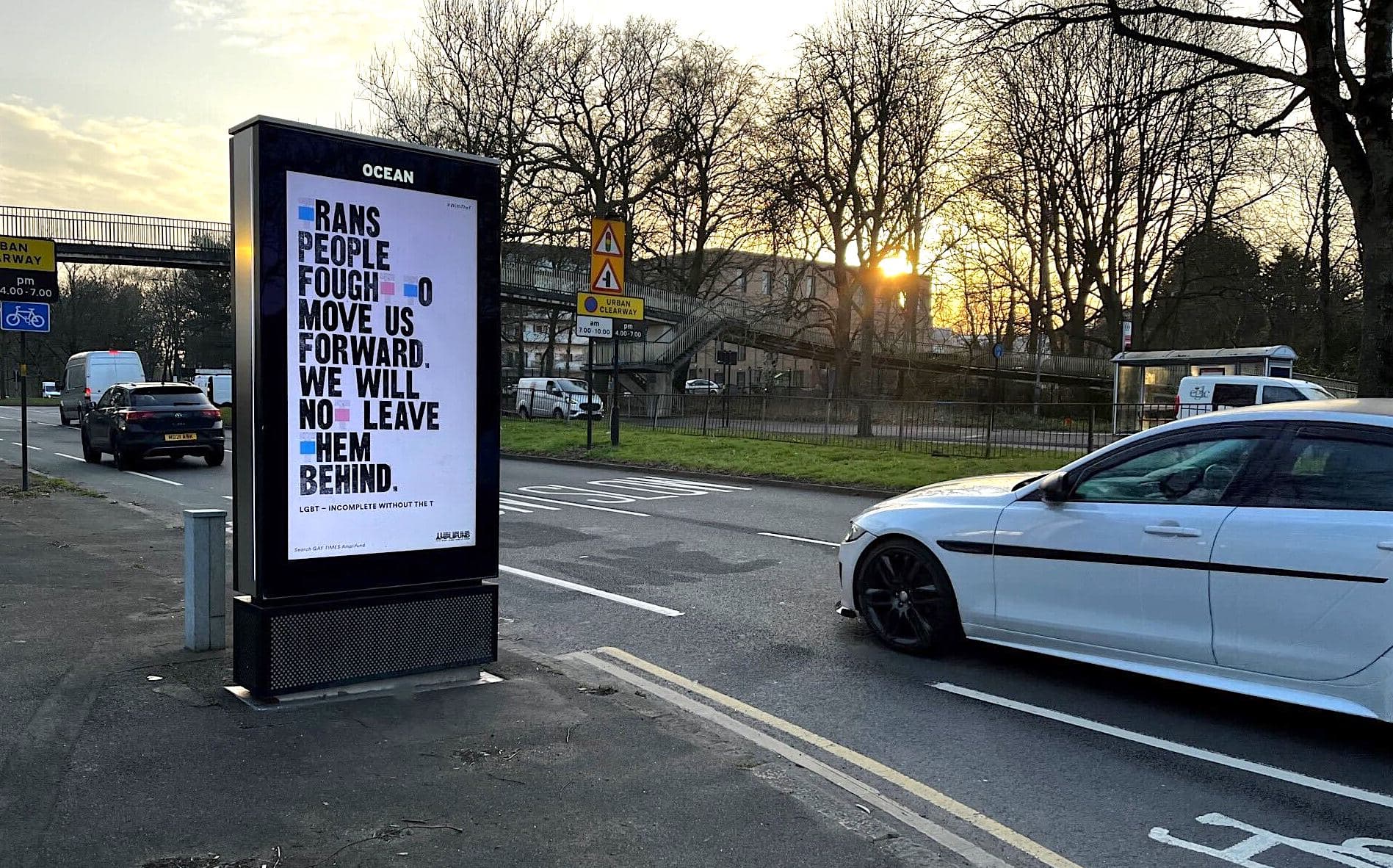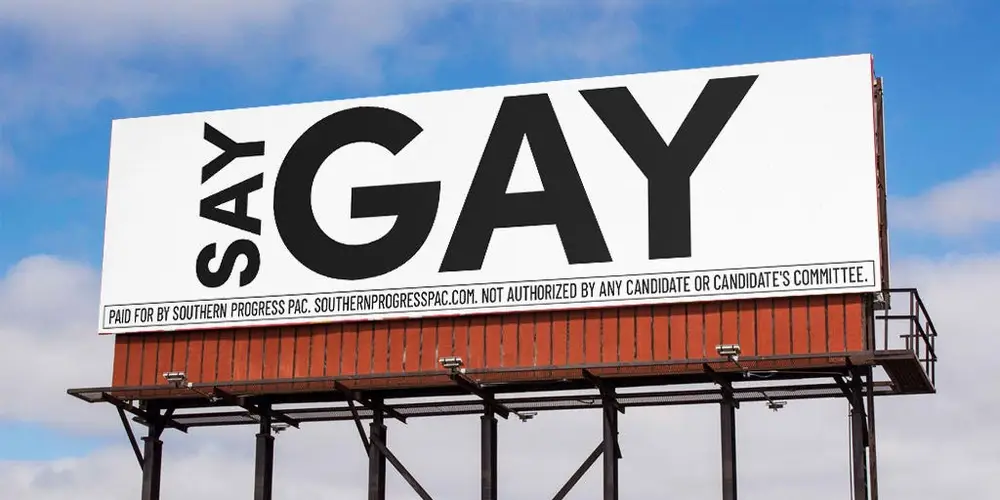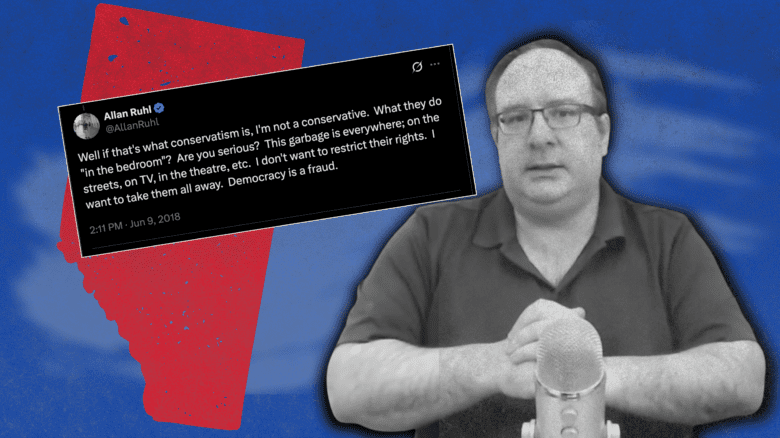Billboards supporting LGBTQ2S+ rights are popping up across the United States and the United Kingdom amid unprecedented global attacks on the community.
Last week billboards reading “Say Gay” began appearing across Florida in response to the state’s controversial “Parental Rights in Education” bill. Coined the “Don’t Say Gay” bill, House Bill 1557 limits discussion of topics regarding sexual orientation and gender identity in K-3 classrooms, although LGBTQ2S+ rights advocates say the bill’s vaguely worded language could amount to a blanket ban in K-12 schools.
As expected, Florida Gov. Ron DeSantis signed HB 1557 into law on March 28. The Republican lawmaker claimed in a statement that parents “should be protected from schools using classroom instruction to sexualize their kids as young as 5 years old.”
But the Southern Progress Political Action Committee (PAC), which funded the series of Florida billboards, has countered that HB 1557 has “nothing to do with protecting children.” In comments to the news website Business Insider, Southern Progress PAC co-founder Amanda Crumley said the law is part of a “an unconscionable, dangerous, and coordinated attack on LGBTQ Americans” timed to the November midterms.
The Florida billboards, however, are just one of a number of campaigns intended to show support to LGBTQ2S+ people under attack during a fraught political moment. On March 25, The Trevor Project launched a series of billboards in Texas aimed at trans youth targeted by a recent directive issued by Republican governor Greg Abbott. In February, Abbott ordered the state’s child welfare services to investigate affirming parents of trans children for abuse, although that policy has since been blocked in court.
“We know LGBTQ youth are listening and watching as their lives are being debated and treated as political pawns on the national stage.”
Crisis calls to The Trevor Project, one of the largest suicide prevention organizations in the U.S., have spiked this year as lawmakers across the country have pushed laws and policies denying rights and resources to LGBTQ2S+ people. More than 130 bills currently under consideration single out trans youth, whether it’s through the denial of health care or by banning them from playing sports in alignment with their lived gender.
“The dangerous rhetoric surrounding gender-affirming medical care as a form of ‘child abuse’ has created fear and anxiety for transgender youth and their families all over the state,” says Amit Paley, executive director and CEO for The Trevor Project, in a emailed statement to Xtra.
By displaying billboards bearing phrases like “Supportive Parents Save Lives” throughout Texas, The Trevor Project hopes to educate the public about its life-saving services and urge local politicians to speak out against harmful policies. According to The Trevor Project’s National Survey on LGBTQ Youth Mental Health, one in five trans and non-binary youth say they have attempted suicide, and only one in three report that their household supports their identity.
“We know LGBTQ youth are listening and watching as their lives are being debated and treated as political pawns on the national stage,” Paley says.
These campaigns are continuing to proliferate across the U.S., with the Ohio-based non-profit Have a Gay Day also running its own series of billboards with affirming messages to trans youth in over a dozen states. But U.S. groups are not alone in reaching out to LGBTQ2S+ people who may be experiencing crisis: Across the pond, Amplifund, the philanthropic arm of U.K. queer magazine Gay Times, and advertising agency Grey London are partnering to bring attention to the difficulties facing the trans community.

Credit: Courtesy of Gay Times/Amplifund
Hundreds of posters and billboards across the U.K. bear messages with the “T” crossed out as part of the nationwide “LGBT—Incomplete Without the T” campaign. For instance, a series of digital advertisements read, “If you hurt one of the queer community, you hurt us all,” but the statement is obscured with that letter erased.
The initiative was first launched during Trans Awareness Week in November, and Gay Times hopes it will raise “awareness of our commitment to our trans+ siblings.” Trans people in the U.K. have been facing challenges from their own political leaders in the past few years, as its government abandoned plans in 2020 to allow trans people to self-identify their gender on legal documents. A year later, U.K. Parliament dismissed a petition to extend legal recognition to non-binary people.
“2021 was the deadliest year for trans people on record, showing that anti-trans right-wing rhetoric is having very dangerous real-world consequences,” says Lewis Corner, the U.K. queer magazine’s editorial director, in a statement to Xtra.
While it is unclear how long each of these billboard campaigns will remain active, Gay Times has listed the locations of its signs online and invited people to take pictures with them to post on social media. “The reaction to this campaign has been incredibly positive,” Corner says. “Most reassuring of all, people are unified in their response that they stand proudly #WithTheT.”


 Why you can trust Xtra
Why you can trust Xtra


